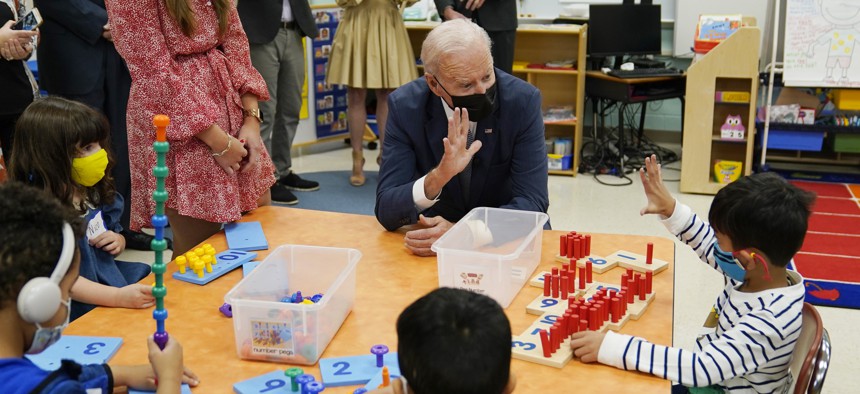What Stays and Goes as Democrats Trim Biden’s Domestic Spending Bill

President Joe Biden talks to students during a visit to East End Elementary School to promote his "Build Back Better" agenda, Monday, Oct. 25, 2021, in North Plainfield, N.J. AP Photo/Evan Vucci
Funding for free community college tuition is likely to be cut and a child tax credit and paid family and medical leave could be limited.
President Biden extolled the benefits of pre-kindergarten education as he toured preschool classrooms in New Jersey on Monday to promote his domestic spending plan.
Expansion of universal pre-K to 3- and 4-year-olds is one of the measures included in Biden’s “Build Back Better” agenda that the president has pushed to keep in a congressional bill as Democrats negotiate down spending levels.
Democratic lawmakers have sought to scale back the initial $3.5 trillion budget reconciliation framework introduced in August, working for months to reach consensus within the party on a package that still includes Biden’s domestic spending priorities. The total cost of the package is expected to be closer to $2 trillion, though the exact provisions included in the bill are still being negotiated.
The White House estimates expansion of universal pre-K would benefit around 5 million children and save the average family $13,000 in child-care costs. Under the $200 billion program, states would eventually be required to pick up 50% of the costs.
Another education measure is likely to be cut, however, Biden said during a CNN town hall last week. On the chopping block is a $109 billion provision that would provide free tuition at two-year community colleges. In place of the free tuition program, Biden said he’s looking to substitute more funding for federal Pell Grants, which provide funding for students with exceptional financial need.
Disagreements between progressives and moderates over the cost of the entire spending plan have threatened to derail the package and jeopardized the future of a separate $1 trillion infrastructure bill. It’s made for arduous negotiating sessions among Democrats.
Biden met Sunday with one Democrat centrist holdout, Sen. Joe Manchin, to discuss proposals. Deputy Press Secretary Karine Jean-Pierre said Monday that progress continued to be made as the “nitty gritty” details were discussed.
Other Cuts on the Table
Other changes to the Build Back Better plan that are being discussed during cost negotiations include limiting a child tax credit to one year rather than extending it through 2025. Democrats increased the credit to $3,600 per child under age 6 and $3,000 per child age 6 – 18 through the American Rescue Plan and parents have been receiving the tax credits in the form of monthly checks.
Another measure expected to be scaled back is paid family and medical leave. Biden confirmed during the CNN town hall that the proposal to provide comprehensive paid family and medical leave for the first time in U.S. history has been scaled back from 12 weeks to four weeks.
A group of 15 Democratic senators wrote to congressional leadership and the Biden administration on Monday asking them to include a “meaningful, comprehensive and permanent” national paid leave program in the bill.
“It must be universal to cover all workers, provide progressive wage replacement to help the lowest wage earners, and cover all existing types of leave with parity,” the lawmakers wrote.
It remains unclear what will happen to a provision of the proposal that would expand Medicare, the government’s flagship health insurance program that covers more than 60 million seniors and disabled people, to include dental, vision and hearing coverage. Biden called it “a reach,” noting opposition to the expansion by Manchin and Sen. Kyrsten Sinema.
But on Monday, Sen. Bernie Sanders said the expansion was non-negotiable.
“The expansion of Medicare to cover dental, hearing and vision is one of the most popular and important provisions in the entire reconciliation bill,” Sanders wrote on Twitter. “It’s what the American people want. It’s not coming out.”
Andrea Noble is a staff correspondent with Route Fifty.
NEXT STORY: Coast Guard plans mobile access to law enforcement database





